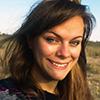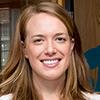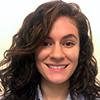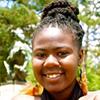
Duke Graduate Students Receive Grants to Expand Training beyond Core Disciplines
Eighteen Duke University students—16 from The Graduate School, one from the School of Nursing and one from the Divinity School—received Graduate Student Training Enhancement Grants (GSTEG) for 2017-2018 from the Office of the Vice Provost for Interdisciplinary Studies.
Stretching beyond their core disciplinary training, these doctoral and master’s students will spend up to one semester acquiring skills, knowledge or experiences that will enhance the approach to their original research.
Hands-on Training
Sarah (Sally) Bornbusch, Ph.D. in Evolutionary Anthropology, Arts & Sciences

Faculty mentor: Christine Drea
Work at North Carolina Museum of Natural Sciences’ Genomics & Microbiology Research Lab to learn how to assess antibiotic resistance in bacterial microbiomes of nonhuman primates, to inform dissertation on relationship between primate gut microbiomes and host health (see update)
Amelia Meier, Ph.D. in Environment, Nicholas School of the Environment

Faculty mentor: John Poulsen
Train at Institute for Research in Tropical Ecology in Gabon to learn genetic analysis methods necessary to identify individual forest elephants, which will inform dissertation on elephant tracking in Gabon (see update)
Seth Sykora-Bodie, Ph.D. in Marine Science and Conservation, Nicholas School of the Environment

Faculty mentors: Lisa Campbell and Andrew Read
Participate in Hawaiian Islands Cetacean and Ecosystem Assessment Survey to inform dissertation on comprehensive approaches to Antarctic resource management and conservation (see update)
Kate Thomas, Ph.D. in Biology, Arts & Sciences

Faculty mentor: Sönke Johnsen
Conduct coding-intensive research at Monterey Bay Aquarium Research Institute, drawing on its database of millions of deep-sea animal sightings, to inform research on vision and bioluminescence in deep-sea cephalopods (see update)
Anna Wade, Ph.D. in Environment, Nicholas School of the Environment

Faculty mentor: Daniel Richter
Train at Pacific Northwest National Laboratory in use of silicon-32, a radioisotope serving as a novel dating tool for environmental processes, which will support dissertation research on legacy sediment (see update)
Jillian Wisse, Ph.D. in Ecology, Arts & Sciences

Faculty mentor: Douglas Nowacek
Learn a novel analysis technique (liquid chromatography/tandem mass spectrometry) at National Institute of Standards and Technology, to support a preliminary analysis using remote blubber biopsy samples from pilot whales (see update)
Internships
Emily Cherenack, Ph.D. in Clinical Psychology, Arts & Sciences

Faculty mentor: Kathleen Sikkema
Volunteer with Femme International to implement reproductive health intervention for adolescent girls in Tanzania, and receive training from Dr. Adam Carrico at University of Miami on how to use biological measures in research with women, which will further ability to conduct research on reproductive and sexual health among adolescent girls in Tanzania (see update)
Mercy DeMenno, Ph.D. in Public Policy, Sanford School of Public Policy

Faculty mentor: Frederick Mayer
Gain hands-on experience working with policymakers and civil society organizations on research related to the theory and practice of effective regulatory governance in the financial sector (see update)
William Gerhard, Ph.D. in Civil and Environmental Engineering, Pratt School of Engineering

Faculty mentor: Claudia Gunsch
Intern with Danish Hydraulic Institute in Singapore to incorporate antibiotic resistance genes and pathogens into a global ballast water movement model, which will support dissertation research and potentially inform policy and regulatory decisions under debate by the United Nations (see update)
Courses
Dustin Benac, Doctor of Theology, Divinity School

Faculty mentor: Craig Dykstra
Attend Qualitative Research Methods Intensive Seminar at University of North Carolina’s Odum Institute for training in qualitative data collection and interpretation, to be applied to a pilot study examining patterns of connection among five church-related educational institutions in Pacific Northwest (see update)
Lok Chan, Ph.D. in Philosophy, Arts & Sciences

Faculty mentor: Kevin Hoover
Take part in Udacity Machine Learning Program to develop skills needed to produce a web-based application for logic education and, through practice, a deeper understanding of philosophical differences between Bayesian and Frequentist statistical methods, which will inform dissertation on learning and testing through lenses of philosophy and statistics (see update)
William Cioffi, Ph.D. in Ecology, Arts & Sciences

Faculty mentor: Andrew Read
Attend course at University of Utah on stable isotope biogeochemistry and ecology, which will support dissertation proposal to use baleen from fin whales to reconstruct individual life histories and assess changes in foraging ecology, reproduction and stress (see update)
Sophie Galson, M.S. in Global Health, Duke Global Health Institute

Faculty mentor: Catherine Staton
Take part in residential immersive Swahili course at The Training Centre for Development Cooperation in Eastern and Southern Africa in Tanzania, to support research project on hypertension in emergency department of Kilimanjaro Christian Medical Center (see update)
Allison Lewinski, Ph.D. in Nursing, School of Nursing

Faculty mentor: Allison Vorderstrasse
Attend course at University College London on applying principles of behavior change in behavioral research interventions, which will help in characterizing social interaction and support among individuals with type-2 diabetes who are interacting in a computer-mediated environment (see update)
Stephanie Manning, M.A. in Digital Art History, Arts & Sciences

Faculty mentor: Sheila Dillon
Attend course at Sotheby’s Art Institute on finance and art market to deepen understanding of art market industry, including financial aspects behind valuing and appraising art, to prepare for career as specialized art consultant or investment analyst (see update)
Bria Moore, Ph.D. in Medical Physics, School of Medicine

Faculty mentor: Terry Yoshizumi
Attend course on radiation emergency medicine at Oak Ridge Associated Universities to learn practical aspects of handling contaminated patients in a hospital setting, which will improve ability to communicate effectively with medical professionals in emergency situations (see update)
Ryan Peabody, Ph.D. in Earth and Ocean Sciences, Nicholas School of the Environment

Faculty mentor: Susan Lozier
Take course at Bermuda Institute of Ocean Sciences on modern observational oceanography with a focus on carbon and nutrient sampling, to support research employing oceanographic data, satellite remote sensing data and models to examine linkage of large-scale ocean circulation and ocean productivity (see update)
Research Materials
Kirsten Overdahl, Ph.D. in Integrated Toxicology and Environmental Health, Nicholas School of the Environment

Faculty mentor: P. Lee Ferguson
Purchase software licenses for cheminformatic programs Schrodinger and Py Mol, which are required for a UNC course on research in pharmaceutical sciences, which will inform dissertation on chemical pollutant structure/occurrence and biological effects (see update)
About GSTEG
This internal funding mechanism from the Office of the Vice Provost for Interdisciplinary Studies encourages graduate students to step away from their core research and training to acquire additional skills, knowledge or co-curricular experiences that will give them new perspectives on their research agendas. These Graduate Student Training Enhancement Grants are intended to deepen preparation for academic positions and other career trajectories.
A January 2017 RFP invited all current Duke graduate students (including master’s, professional and Ph.D. students) to propose graduate training enhancement activities lasting up to one semester. Proposals were reviewed by an ad hoc committee convened by the Vice Provost for Interdisciplinary Studies with representation from faculty, institute directors and graduate students, representing all divisions of knowledge.